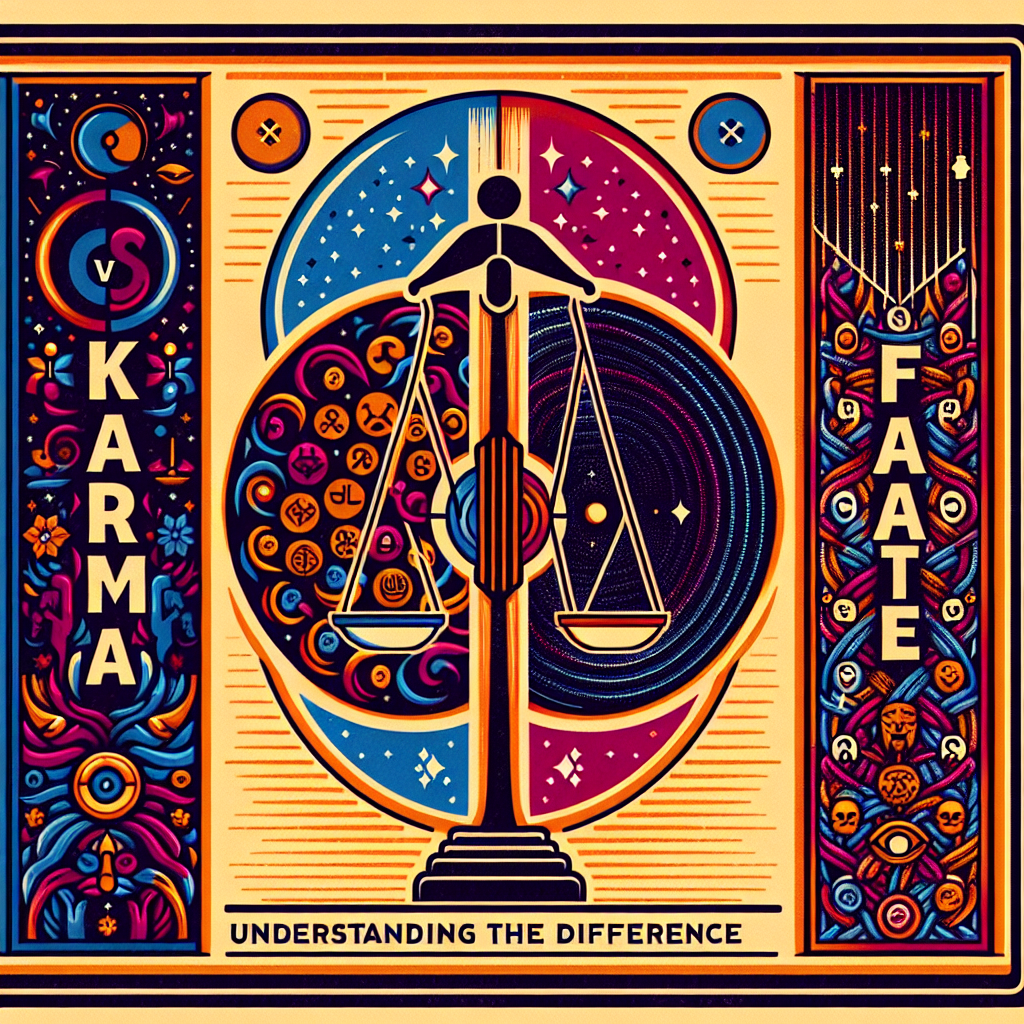The concepts of karma and fate are often discussed in philosophical, spiritual, and everyday contexts, often leading to confusion. Both terms suggest a level of predetermined outcome in our lives, but they stem from different ideologies and implications. Understanding these differences can lead to a more nuanced perspective on life, choices, and consequences.
Defining Karma
Karma is a term derived from ancient Indian philosophy and is a crucial element in various religions, including Hinduism, Buddhism, and Jainism. The word itself means “action” or “deed,” and it signifies the law of cause and effect, where every action has corresponding consequences.
In the context of karma, it is crucial to understand that actions aren’t merely physical but can also be mental, emotional, and verbal. The law of karma emphasizes that positive actions lead to favorable outcomes, while negative actions can result in suffering. In this way, individuals are accountable for their actions throughout their lifetimes, which is a central tenet of karma.
The Types of Karma
- Sanchita Karma: This is the accumulated karma from all past lives, representing all the actions that an individual has ever committed.
- Prarabdha Karma: This refers to the portion of sanchita karma that is responsible for the present life. It is the karma that is currently being experienced.
- Aagami Karma: This term describes the karma that will be created from actions taken in the present, influencing future lives.
Defining Fate
Fate, unlike karma, is often understood as a predetermined course of events that are beyond an individual’s control. It is a more fatalistic perspective, suggesting that regardless of our choices, certain events and outcomes will occur. The concept of fate can be found in various cultures and is often associated with destiny.
In many narratives, fate is seen as an unchangeable power or force that dictates the direction of life. For example, the Greek myth of the Fates personifies this concept, presenting three sisters who weave the destinies of humans irrespective of individuals’ choices.
The Nature of Fate
Whereas karma is based on individual actions, fate emphasizes an overarching purpose or a natural order. This means that while individuals can influence some aspects of their lives, there are elements determined by fate that are beyond personal agency. The relationship between fate and free will remains a topic of vibrant discussion in philosophical and theological dialogues.
Comparing Karma and Fate
While karma and fate often overlap in discussions about life and destiny, they revolve around fundamentally different principles. The key differences can be highlighted in several aspects:
Accountability
Karma emphasizes personal responsibility. Individuals are encouraged to be mindful of their actions, as they will have repercussions. In contrast, fate suggests a lack of accountability, as certain outcomes are preordained regardless of one’s actions.
Agency vs. Determinism
Karma is closely tied to the empowerment of agency, indicating that individuals have the power to shape their own destinies through conscious actions. Meanwhile, fate leans toward determinism, positing that events are predetermined and unavoidable. This can lead to feelings of helplessness if one views life solely through the lens of fate.
Temporal Scope
Karma operates on an extended timeline that includes the past (sanchita karma), present (prarabdha karma), and future (aagami karma). It is not confined to a single lifetime but is rather an ongoing cycle. Fate, on the other hand, often pertains to specific events or outcomes that may be looming in the near future or predestined in one’s life path.
The Interplay Between Karma and Fate
Understanding the relationship between karma and fate is not entirely straightforward. While they can be seen as opposing concepts, they can also coexist in a dynamic relationship. This interplay suggests that while fate may set certain parameters, how individuals navigate those circumstances is influenced by their karma.
For instance, a person may find themselves in a situation that feels predetermined (fate), but their reactions, choices, and the energy they bring to those circumstances are shaped by their past actions (karma). Thus, while fate may present opportunities or challenges, karma determines how one interacts with those circumstances.
Cultural Perspectives on Karma and Fate
Across various cultures and belief systems, different interpretations of karma and fate emerge, impacting how individuals view ethics, morality, and justice.
Eastern Philosophies
In Eastern philosophies, especially in Hinduism and Buddhism, karma is an integral concept pertaining to the cycle of samsara (the cycle of birth, death, and rebirth). These traditions emphasize the importance of ethical living and awareness of one’s actions in daily life.
Fate in the Eastern context can also relate to the concept of dharma, which refers to the moral order of the universe and an individual’s duty within it. It highlights that even while individuals may have the agency to make choices, these choices should align with the greater cosmic order.
Western Philosophies
In Western cultures, fate has often been personified in literature and myth, leading to debates around free will versus determinism. The writings of philosophers like Aristotle and Immanuel Kant explore human agency, while modern interpretations veer into discussions of existentialism, where individuals create their own essence through choices.
Much of Western literature, such as Shakespeare’s tragedies, explores the tension between fate and human desire, where characters often struggle against predetermined outcomes, highlighting a complex relationship between the two concepts.
Practical Implications in Daily Life
Recognizing the differences between karma and fate can lead to personal growth and increased awareness in one’s daily life. Understanding karma encourages mindfulness about actions and their potential consequences, fostering ethical decision-making. This recognition can lead individuals to create positive ripples in their communities, thus contributing to an overall good.
Conversely, understanding fate allows individuals to cultivate acceptance in circumstances beyond their control. This acceptance can foster resilience and a sense of peace when faced with challenges, allowing for emotional growth and a more profound understanding of one’s life path.
Mindfulness and Acceptance
The practices of mindfulness and acceptance reinforce the core tenets of both karma and fate. By being present and intentional in one’s actions (a karmic principle), individuals can make choices that enrich their lives and the lives of others.
Simultaneously, embracing acceptance regarding certain life circumstances can reduce unnecessary suffering. This harmonizing practice encourages individuals to focus on what they can change while also recognizing what may not be within their influence due to fate.
Conclusion
The concepts of karma and fate are essential to understanding the complexities of human existence. While karma emphasizes individual responsibility and the consequences of actions, fate underscores the inevitability of certain events beyond personal control. Both philosophies can coexist, creating a profound interplay that shapes our lives.
By recognizing the differences and relationships between karma and fate, individuals can adopt a more balanced approach to life, allowing them to navigate challenges with wisdom and grace. Embracing both perspectives offers a richer understanding of existence, enhancing personal growth, and paving the way toward a meaningful life.
FAQs
What is the main difference between karma and fate?
The main difference is that karma emphasizes personal responsibility and the impact of one’s actions, while fate suggests that certain outcomes are predetermined and beyond individual control.
Can karma and fate coexist?
Yes, karma and fate can coexist. While fate may set certain circumstances, an individual’s karma—shaped by past actions—determines how they navigate those circumstances.
Does karma only apply to actions in this life?
No, karma encompasses all actions across multiple lifetimes, affecting future rebirths and experiences. It operates on the principles of cause and effect throughout the continuum of life.
How does acceptance relate to fate?
Acceptance in relation to fate involves recognizing and embracing the situations in life that cannot be changed. This mindset fosters resilience and peace, allowing individuals to focus on what they can control.
How can understanding karma improve my life?
Understanding karma can improve your life by making you more conscious of your decisions and actions. It encourages ethical living and personal growth, enhancing relationships with yourself and others.
Sure! What would you like to discuss or know more about? If you have a specific prompt in mind or a topic you’d like me to elaborate on, please share!, #Karma #Fate #Understanding #Difference, #Karma #Fate #Understanding #Difference, 1736232864, karma-vs-fate-understanding-the-difference





